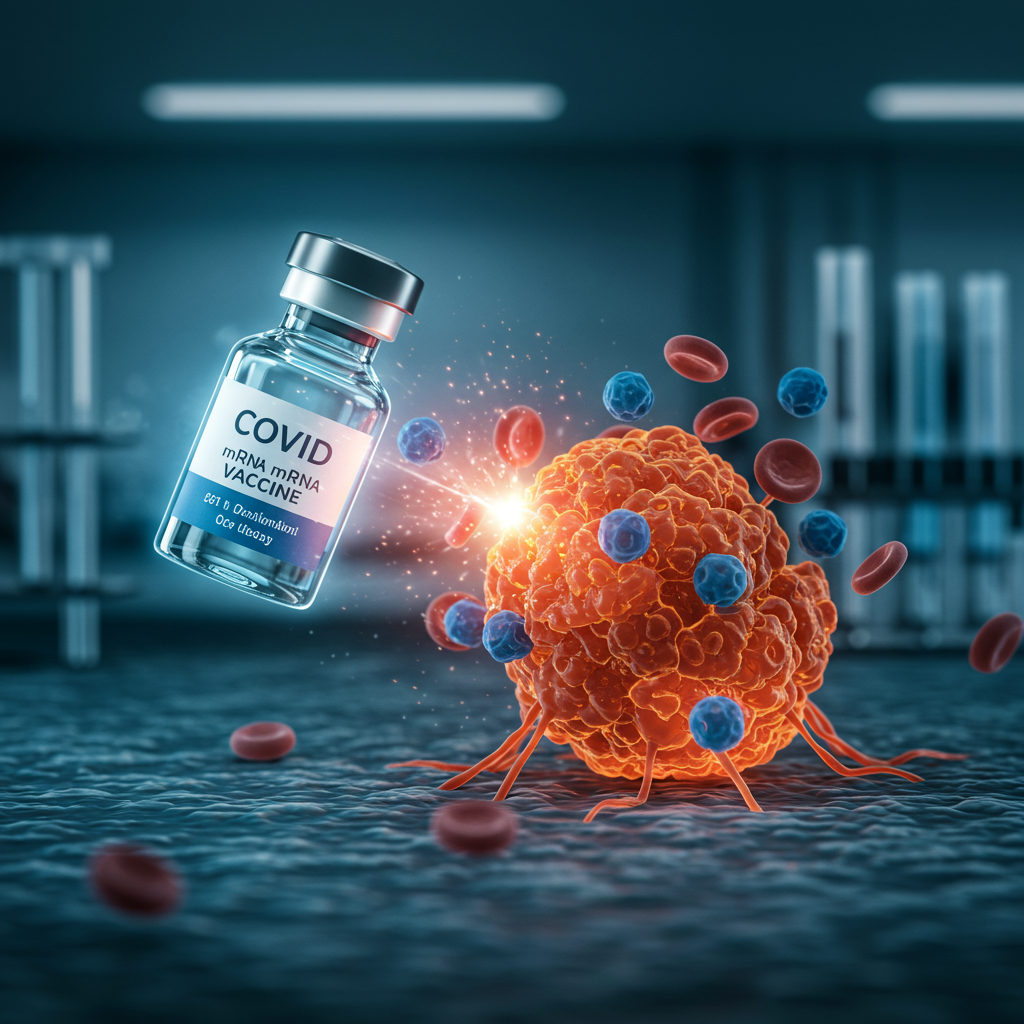A revolutionary discovery is changing the landscape of cancer treatment, suggesting that common COVID mRNA vaccines may significantly boost the effectiveness of existing immunotherapies. This unexpected synergy could unlock new hope for patients whose tumors previously resisted standard treatments. Researchers have found that these vaccines, originally designed to combat SARS-CoV-2, possess a remarkable ability to reprogram the immune system. They can turn “cold” tumors, typically unresponsive to therapy, into “hot” ones that actively fight back against cancer.
Unlocking Immunotherapy’s Full Potential
Immune checkpoint inhibitors (ICIs) represent a powerful class of drugs that have revolutionized cancer care for many. By releasing the natural “brakes” on immune cells, ICIs empower the body’s own defenses to recognize and attack cancer. Despite their success, a significant challenge remains: a large number of patients do not benefit from these therapies. Their tumors often exist within an immunosuppressive microenvironment, characterized by cells that actively suppress the immune response. This makes cancer cells invisible or resistant to the immune system’s attack.
For years, scientists have sought ways to sensitize these resistant tumors to ICIs. Personalized mRNA cancer vaccines, designed to target specific tumor antigens, showed promise but faced hurdles with complex and time-intensive manufacturing. The breakthrough linking COVID mRNA vaccines to enhanced cancer immunity offers a widely available and potentially immediate solution. This research highlights the unexpected power of mRNA technology as a general immune modulator, far beyond its initial use in infectious disease prevention.
A Remarkable Survival Boost: Clinical Evidence
Compelling clinical data underscores the profound impact of this discovery. A comprehensive study at The University of Texas MD Anderson Cancer Center analyzed data from over a thousand patients. It revealed that receiving a COVID mRNA vaccine within 100 days of starting ICI therapy was associated with substantially improved overall survival (OS).
For patients with stage III/IV non-small cell lung cancer (NSCLC), the benefits were striking. Vaccinated patients saw their median OS nearly double, soaring from 20.6 months to 37.3 months. The 3-year OS rate also significantly increased from 30.8% to 55.7%. These improvements persisted even after accounting for numerous other factors like clinical stage, steroid use, and mutation status.
Similar positive outcomes were observed in patients with metastatic melanoma. Those who received a COVID mRNA vaccine within the crucial 100-day window experienced a substantially improved 36-month OS rate of 67.6% compared to 44.1% for unvaccinated patients. Progression-free survival (PFS) also showed significant improvement. This consistent survival benefit across different aggressive cancer types underlines the broad potential of this vaccine-immunotherapy synergy. Importantly, these benefits were specific to mRNA vaccines and ICI therapy, not seen with chemotherapy alone or with non-mRNA vaccines like those for flu or pneumonia.
Decoding the Mechanism: How mRNA Reprograms Immunity
The key to understanding this phenomenon lies in how mRNA vaccines interact with the immune system. Researchers in preclinical models, including those at the University of Florida, found that SARS-CoV-2 mRNA vaccines trigger a substantial increase in type I interferon (IFN). This potent cytokine acts as a critical signal, enabling innate immune cells—such as dendritic cells and macrophages—to become highly activated.
These activated innate immune cells then effectively “prime” CD8+ T cells to target tumor-associated antigens. Essentially, the vaccine creates an environment where the immune system, invigorated by its response to the mRNA, starts to recognize and attack cancer cells more effectively. This process, known as epitope spreading, means the immune response expands to target multiple cancer antigens, strengthening the anti-tumor attack.
A crucial finding from mouse models demonstrated that this anti-tumor effect was entirely dependent on type I interferon signaling. Blocking the IFN receptor completely abolished the benefits. Furthermore, the study revealed that it’s the innate immune sensing of the mRNA itself, rather than just the specific antigen (like the SARS-CoV-2 spike protein), that drives much of this anti-tumor activity. This suggests a broader potential for “universal” mRNA formulations not tied to a specific virus. The vaccine’s mRNA, encased in lipid nanoparticles, activates intracellular sensors like MDA5, leading to the vital type I interferon production.
Transforming “Cold” Tumors into “Hot” Responders
Many tumors are described as “cold” because they lack immune cell infiltration and fail to provoke a strong immune response. These cold tumors are typically resistant to ICIs. One of the most significant revelations of this research is the ability of COVID mRNA vaccines to transform these cold tumors into “hot” ones.
The surge in type I interferon and subsequent immune activation leads to a critical change within the tumor microenvironment (TME): an increase in PD-L1 expression on tumor cells. PD-L1 is a protein that cancer cells often display to evade immune attack by binding to PD-1 on T cells. While this might seem counterintuitive, this upregulation of PD-L1 is precisely what makes ICIs effective. By blocking the PD-1/PD-L1 pathway, ICIs release the T cells, allowing them to attack the now-visible cancer cells.
Human data supports this mechanism: NSCLC patients who received a COVID-19 mRNA vaccine showed a 24% average increase in PD-L1 tumor proportion score (TPS). More importantly, they were 29% more likely to cross the 50% TPS threshold, a key indicator for single-agent immunotherapy eligibility. This suggests that vaccination makes previously resistant tumors amenable to ICI therapy, offering a tangible pathway to overcome intrinsic resistance.
Beyond COVID: The Vision for Universal Cancer Vaccines
This groundbreaking research goes beyond a surprising side effect of COVID mRNA vaccines. It points towards a future where “off-the-shelf” mRNA formulations could serve as universal tools to prime the immune system against various cancers. This “third emerging paradigm” in cancer vaccine development, championed by researchers like Dr. Elias Sayour at the University of Florida, suggests that vaccines designed for general immune stimulation can trigger potent anti-cancer reactions.
iOncologi, Inc., a biotechnology company, has already secured a foundational U.S. patent for RNA-based formulations designed to enhance tumor responsiveness to ICI therapy, leveraging these very discoveries. Their UNIFYRs™ platform aims to specifically utilize RNA-driven immune reprogramming to restore and amplify ICI efficacy across solid tumors. This innovative approach could revolutionize solid tumor treatment by offering a universal strategy to overcome immune resistance.
The implications are extraordinary. This strategy could extend the benefits of ICIs to a much wider patient population, including those with hard-to-treat “cold” tumors. Imagine a broadly applicable, low-cost mRNA vaccine that sensitizes a patient’s individual tumor to immune responses, potentially transforming advanced cancer into a manageable chronic disease. While requiring further validation through randomized clinical trials, the promise of this research is immense, potentially reshaping how we approach cancer therapy.
Important Considerations and Future Directions
While the findings are incredibly promising, it’s crucial to understand their current context. This research is observational and retrospective, highlighting a strong association rather than definitive causation in humans. Patients should not self-administer COVID-19 vaccines with the sole intention of treating cancer. Any decisions regarding treatment must be made in close consultation with an oncologist, considering individual medical history and treatment plans.
The scientific community is eager to translate these findings into formal clinical practice. Plans for phase 3 randomized clinical trials are already underway through networks like OneFlorida+, aiming to rigorously confirm efficacy and causality. Future research will also focus on optimizing non-specific mRNA vaccine designs to enhance their anti-cancer efficacy and safety profiles even further. This could lead to purpose-built universal cancer vaccines, capable of rallying a broad spectrum of immune effectors for durable cancer control. The collaboration between academic research and industry, like that with iOncologi, Inc., is pivotal in accelerating these therapies to patients.
Frequently Asked Questions
How do COVID-19 mRNA vaccines enhance cancer immunotherapy?
COVID-19 mRNA vaccines enhance cancer immunotherapy by acting as potent immune modulators. They trigger a significant surge in type I interferon, activating innate immune cells like dendritic cells. These activated cells then prime CD8+ T cells to recognize and attack tumor-associated antigens. This process also leads to increased PD-L1 expression on tumor cells, making them more visible and susceptible to immune checkpoint inhibitors. The vaccine essentially “wakes up” the immune system and reprograms the tumor microenvironment for a stronger anti-cancer response.
Which cancer types have shown improved outcomes with this vaccine-ICI synergy?
The research, primarily from MD Anderson Cancer Center, has shown significant improvements in overall survival and progression-free survival in patients with stage III/IV non-small cell lung cancer (NSCLC) and metastatic melanoma. These benefits were observed when patients received a COVID-19 mRNA vaccine within 100 days of initiating immune checkpoint inhibitor (ICI) therapy. Broader studies also indicate improved survival for ICI-treated patients across various other tumor types, suggesting a generalizable effect.
What does this discovery mean for cancer patients and future treatment strategies?
This discovery offers profound implications for cancer patients, especially those whose tumors are resistant to current immune checkpoint inhibitors. It suggests a widely available, low-cost method to potentially sensitize these “cold” tumors and extend the benefits of immunotherapy to more individuals. For the future, this research paves the way for developing “universal” mRNA vaccines specifically designed to prime the immune system against various cancers, potentially transforming advanced cancer into a more manageable condition or even achieving long-term remission. However, these findings are observational and require confirmation through ongoing and planned randomized clinical trials before becoming standard practice.
This groundbreaking research reveals the hidden potential of widely available mRNA vaccines, repositioning them as powerful tools in the fight against cancer. By sensitizing resistant tumors and enhancing the efficacy of immune checkpoint inhibitors, COVID mRNA vaccines offer a novel pathway to improve patient outcomes. As further clinical trials unfold, this paradigm-shifting discovery could redefine cancer treatment, offering new hope and broader access to life-extending therapies for millions worldwide.




